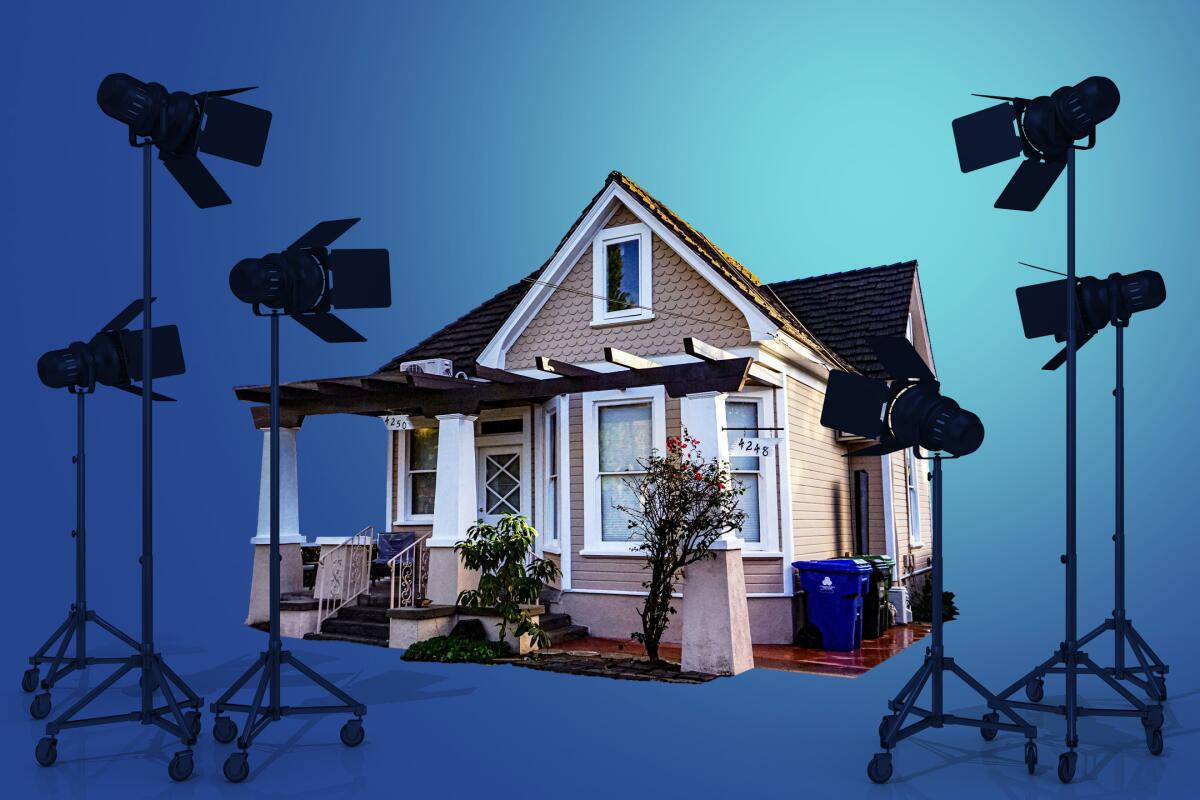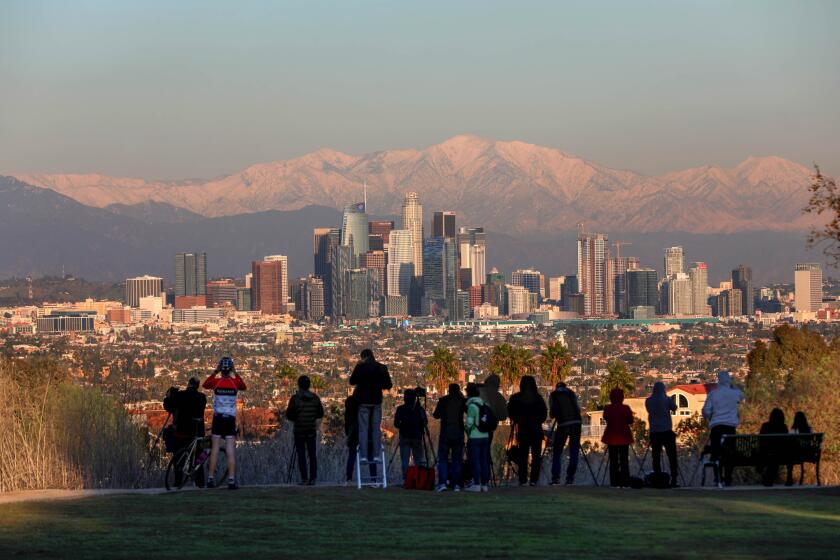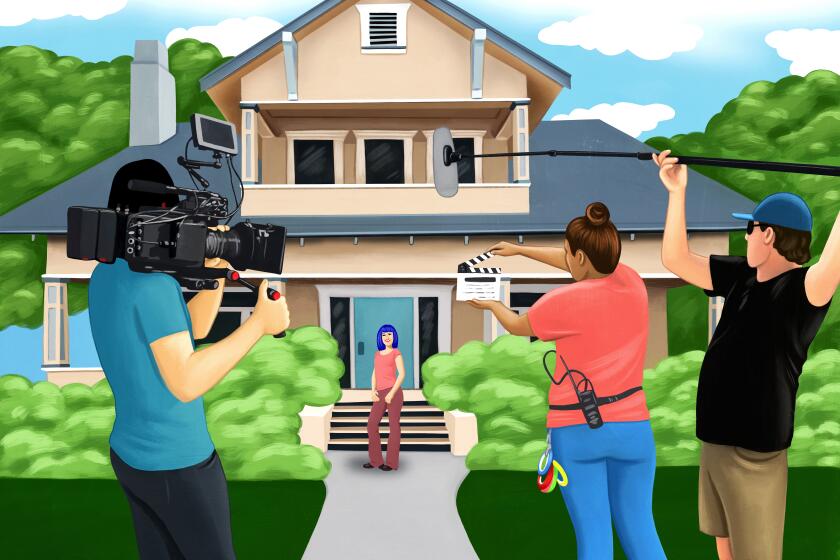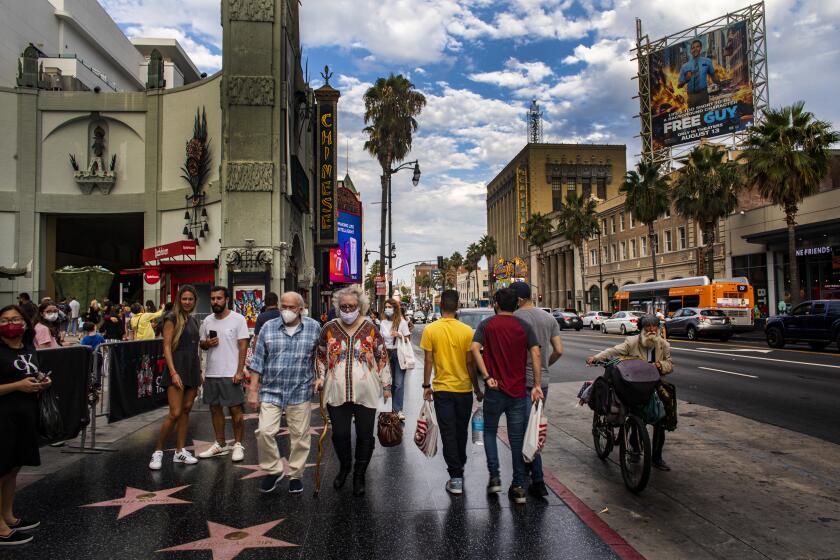Renting your home as a film location may pay off big time. But is it worth the risk?

Last year, we began asking readers to send us their pressing questions about Los Angeles and California.
Every few weeks, we put the questions to a vote, inviting readers to decide which query we should answer in story form.
This question, which we found on the #AskLosAngeles subreddit, came in second on one of our latest reader polls: What’s it like to list your home for use as a filming location?
It was a windy night in late March 2021. A movie was shooting on an otherwise quiet, residential street in Pasadena.
All of a sudden, a lighting crane toppled onto its side, striking the roof of a two-story home.
No one was hurt, according to the Los Angeles County Fire Department, but photos and a video from the incident revealed smashed shingles and siding — no one’s idea of a peaceful Tuesday night.
Having a Hollywood movie or TV show film at your home or in your neighborhood sounds glamorous, and it can be.
But on the flip side, there’s always a risk of damage occurring during a shoot, although situations like a capsized lighting crane are, fortunately, rare.
Despite any risks, plenty of Angelenos allow their homes to be turned into film sets.
“Some people do this for the money. And some people just like doing it, because they like having that type of activity,” said Paul Kim, founder and owner of Image Locations, a company that has connected homeowners with productions that sometimes involve A-list celebrities such as Beyoncé, Oprah Winfrey, Leonardo DiCaprio and Lady Gaga.
Let’s cut to the chase: How much can you make from renting your home as a film location?
“Back in the day, people were OK with like $4,000 or $5,000 for a 12- or 14-hour day,” Kim said. Now, “location budgets have doubled or tripled.”
“The high end of our homeowners make $1 million a year. The low end, probably $12,000.”
A reader asked why L.A.’s recognizable skyline — with skyscrapers such as the Wilshire Grand Center and U.S. Bank tower — developed roughly 15 miles from the Pacific. We have answers.
One of Kim’s clients — a homeowner in Sherman Oaks — hit the film location jackpot after having their home used as one of primary film locations of “Made for Love,” a series that aired on HBO Max. “They said that they paid for their kid’s college with that one show.”
There is also a tax benefit — homeowners can rent their home, including as a film location, for up to 14 days annually without having to pay taxes on the income generated.
Can every homeowner expect this type of payday if they choose to rent their home as a film set?
Not quite. As you might expect, filmmakers can be pretty selective about where they decide to shoot.
In the beginning, Image Locations took “everybody because we wanted the volume,” Kim said, recalling his early location recruitment strategies. Now, “we really want the over-the-top, unique houses that have lots of room to work with.”
“It could be a huge mansion in the Hollywood Hills or Malibu. But if it’s unique in some way, like if it’s a Frank Lloyd Wright, we would take it,” he said.
Interested in renting your home as a film location? Wondering how the scouting process works? My colleague Jon Healey, senior editor on the Times’ Utility Journalism team, will tell you all about it.
You’ll probably need the help of a film location service that has good contacts with ad agencies and filmmakers. And even then, it helps to have the right kind of space.
Thinking about listing your home as a film location? Already had a scout or two knocking on your door? Here are some questions to ask.
First, take a close look at guidance published by the California Film Commission, which describes what to expect during the production process.
“If you get a stranger knocking on your door and saying, ‘Hey, we want to use your house,’ you want to ask, ‘Who is the production company?’ Kim said.
In addition, you should ask for proof of insurance and make sure it hasn’t expired, Kim said.
Kim works only with productions that are “fully insured,” he said. “They have at least $1 million worth of general liability right now. [And] we’re asking $2 million for bigger houses for general liability.”
Make sure to review the insurance policy to make sure you’re protected against liability too, Healey notes in his story.
Plus, Kim advises homeowners to collect a security deposit, in case of any accidents. “I would say anywhere from $2,500 to $10,000,” depending on how extensive the scenes are and how much of the home will be utilized.
Image Locations typically holds a security deposit of roughly $10,000 for incidentals, such as a broken sprinkler head, which is rarely used, he said. “Of the 20 years I’ve been doing this, I think I’ve had less than 10 insurance claims.”
When tourists see Angelenos acting “so L.A.,” it may say more about the expectations they bring with them.
Now, to answer the original question: What does filming at a private residence entail? What are some of the risks?
The experience of inviting a film crew into your home can take many different forms.
“Sometimes it’s just two actors, and they have a conversation on the porch, or something like that — all the way up to giant fight scenes, all through the house [with] all kinds of stuff getting shot or blown up,” said production sound mixer Tom Curley, who has “worked in just about every type of domicile you can imagine, from a shack in the jungle in Colombia, to $80-million mansions, and everything in between.”
On a typical day of filming, a principal cast and crew of 70 to 80 people will descend upon the home, Kim said, though this number could increase to 150 or 200 people depending on how many extras are needed in the scene. “They’ll have a moving truck, and they’ll put your furniture in their truck and take out the [set] furniture. ... A homeowner has to be OK with things like that.”
Location, location, location! Pretend you’re a part of the movies by heading to a bar featured in ‘Once Upon a Time … in Hollywood’ or dancing where the lovers flirted in ‘La La Land.’
Curley said he hasn’t witnessed any major damage to a private home during his more than two decades on film sets.
“Generally, the worst that I have seen is that a stand or piece of equipment will bump into a wall and cause some minor damage to some sheetrock or a maybe a piece of molding around a door,” he said. “Also, some floor damage is possible.”
Alison Kelly, a retired dietitian, has had both the Closer and NCIS shoot at her Craftsman home in Larchmont.
She’s never experienced any headaches from filming at her home, apart from one instance when the production crew lit a fire in her fireplace and forgot to open the vent.
“The house got very hot very fast,” she said. “Some people are just a little bit clueless … I wouldn’t say that everybody is like that, but you’re always going to have to be aware.”
Kelly recommends asking the production to use layout boards to protect flooring and “be sure they document the state of your house and belongings before the shoot prep begins.”
Having film crews at her house has been a consistently positive experience, she said. “The folks that we’ve dealt with, they were professional,” she said. “I’m appreciative just to be able to kind of hang back and watch the fun process.”
The first step in your Hollywood career shouldn’t be paying L.A. rent. Here’s how to take your first steps toward a career in the entertainment industry, according to experts.
She also received some unexpected home improvement from NCIS crew members. Prior to filming, she had her home’s foundation redone, which caused some walls to crack.
“It was unsightly,” she said. During the production process, the crew members ended up fixing the damage. “That was pretty awesome.”
Perks such as home improvement aside, potential for home damage — however minor it may be — means homeowners shouldn’t be shy about asking any questions they might have, Curley said.
“It’s important to communicate all of your concerns and make sure that everything is agreed to in writing. Make sure that you’re protecting yourself as much as you can,” he advised.
After that, Curley said, “have fun and make some money with it.”
More to Read
Sign up for Essential California
The most important California stories and recommendations in your inbox every morning.
You may occasionally receive promotional content from the Los Angeles Times.















